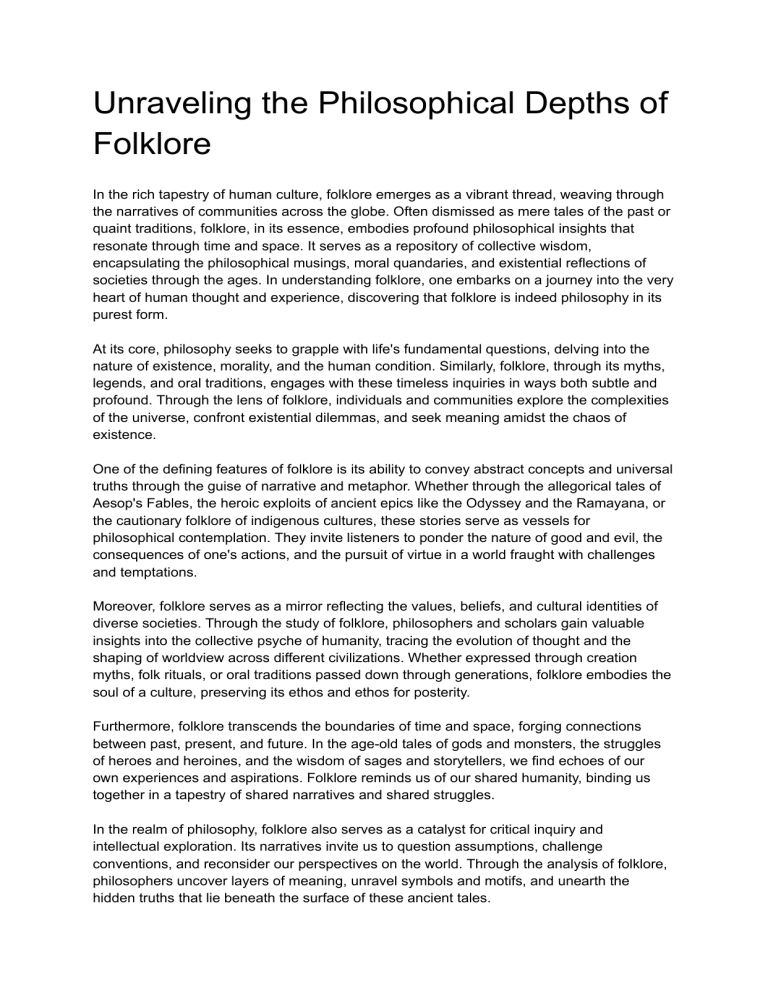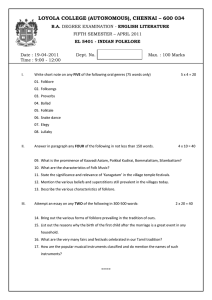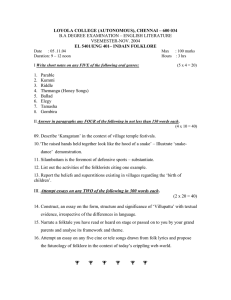
Unraveling the Philosophical Depths of Folklore In the rich tapestry of human culture, folklore emerges as a vibrant thread, weaving through the narratives of communities across the globe. Often dismissed as mere tales of the past or quaint traditions, folklore, in its essence, embodies profound philosophical insights that resonate through time and space. It serves as a repository of collective wisdom, encapsulating the philosophical musings, moral quandaries, and existential reflections of societies through the ages. In understanding folklore, one embarks on a journey into the very heart of human thought and experience, discovering that folklore is indeed philosophy in its purest form. At its core, philosophy seeks to grapple with life's fundamental questions, delving into the nature of existence, morality, and the human condition. Similarly, folklore, through its myths, legends, and oral traditions, engages with these timeless inquiries in ways both subtle and profound. Through the lens of folklore, individuals and communities explore the complexities of the universe, confront existential dilemmas, and seek meaning amidst the chaos of existence. One of the defining features of folklore is its ability to convey abstract concepts and universal truths through the guise of narrative and metaphor. Whether through the allegorical tales of Aesop's Fables, the heroic exploits of ancient epics like the Odyssey and the Ramayana, or the cautionary folklore of indigenous cultures, these stories serve as vessels for philosophical contemplation. They invite listeners to ponder the nature of good and evil, the consequences of one's actions, and the pursuit of virtue in a world fraught with challenges and temptations. Moreover, folklore serves as a mirror reflecting the values, beliefs, and cultural identities of diverse societies. Through the study of folklore, philosophers and scholars gain valuable insights into the collective psyche of humanity, tracing the evolution of thought and the shaping of worldview across different civilizations. Whether expressed through creation myths, folk rituals, or oral traditions passed down through generations, folklore embodies the soul of a culture, preserving its ethos and ethos for posterity. Furthermore, folklore transcends the boundaries of time and space, forging connections between past, present, and future. In the age-old tales of gods and monsters, the struggles of heroes and heroines, and the wisdom of sages and storytellers, we find echoes of our own experiences and aspirations. Folklore reminds us of our shared humanity, binding us together in a tapestry of shared narratives and shared struggles. In the realm of philosophy, folklore also serves as a catalyst for critical inquiry and intellectual exploration. Its narratives invite us to question assumptions, challenge conventions, and reconsider our perspectives on the world. Through the analysis of folklore, philosophers uncover layers of meaning, unravel symbols and motifs, and unearth the hidden truths that lie beneath the surface of these ancient tales. Moreover, folklore inspires creativity and imagination, sparking the imagination of artists, writers, and thinkers across disciplines. From literature and art to music and film, folklore permeates our cultural landscape, enriching our creative endeavors with its timeless themes and archetypal motifs. In reimagining folklore for contemporary audiences, artists breathe new life into age-old tales, infusing them with fresh perspectives and interpretations that resonate with modern sensibilities. In conclusion, folklore is indeed philosophy in its purest form, a repository of timeless wisdom and universal truths that transcends the boundaries of time, culture, and language. Through its narratives, symbols, and motifs, folklore invites us to explore the depths of the human experience, confront life's existential mysteries, and seek meaning amidst the complexities of existence. As we journey through the rich tapestry of folklore, we discover not only the wisdom of the past but also the enduring relevance of philosophical inquiry in our quest to understand ourselves and the world around us. Moreover, the philosophical depth of folklore extends beyond its narrative elements; it permeates the very fabric of human society, influencing our values, shaping our identities, and guiding our collective consciousness. Through the rituals, customs, and traditions embedded within folklore, communities forge bonds of solidarity, transmit cultural knowledge, and affirm shared values and beliefs. Whether in the rituals of initiation, the ceremonies of passage, or the celebrations of harvest and renewal, folklore serves as a living expression of humanity's ongoing dialogue with the divine, the natural world, and each other. Furthermore, folklore embodies the dynamic interplay between the individual and the collective, highlighting the tension between autonomy and belonging, freedom and responsibility. In the tales of heroes and heroines who embark on epic quests, confront formidable challenges, and ultimately transcend their limitations, we find echoes of our own struggles and aspirations for self-realization. Yet, woven into these narratives are also lessons of community, cooperation, and the recognition of our interconnectedness with the wider world. Additionally, folklore serves as a testament to the resilience of the human spirit, bearing witness to the triumphs and tragedies of our shared history. In the myths of creation and destruction, the legends of triumph and defeat, and the folklore of survival and adaptation, we confront the complexities of human existence and the enduring quest for meaning and purpose. Through the lens of folklore, we come to appreciate the enduring power of storytelling as a means of healing, transformation, and collective renewal in the face of adversity. Moreover, in an age marked by rapid globalization and technological advancement, folklore remains a vital link to our cultural heritage and ancestral wisdom. In the face of homogenizing forces that threaten to erode traditional identities and marginalize indigenous knowledge, folklore serves as a beacon of cultural resilience and resistance. By reclaiming and revitalizing their folk traditions, communities affirm their unique identities, assert their right to self-determination, and preserve their cultural heritage for future generations. In conclusion, the philosophical depth of folklore lies not only in its narrative richness and symbolic imagery but also in its profound impact on human consciousness, society, and culture. Through its timeless tales, archetypal motifs, and enduring themes, folklore invites us to explore the depths of the human experience, confront life's existential mysteries, and forge connections with each other and the world around us. As we embrace the wisdom of folklore, we affirm our shared humanity, celebrate our cultural diversity, and honor the enduring power of storytelling to illuminate the path forward in our collective journey towards understanding, compassion, and transformation. Furthermore, the philosophical essence of folklore is deeply intertwined with the evolution of human thought and the quest for meaning in a complex and ever-changing world. As societies grapple with existential questions and moral dilemmas, folklore emerges as a repository of ethical insights, spiritual wisdom, and existential reflections. Through its allegorical narratives and symbolic imagery, folklore offers profound insights into the human condition, inviting us to contemplate our place in the cosmos, the nature of reality, and the mysteries of existence. Moreover, folklore serves as a dynamic cultural matrix, continually evolving and adapting to the changing needs and aspirations of society. While rooted in the traditions of the past, folklore also reflects the ongoing dialogue between tradition and innovation, preserving ancient wisdom while embracing new perspectives and interpretations. In this way, folklore remains a living testament to the resilience and creativity of human culture, embodying the interplay between continuity and change, preservation and transformation. Additionally, folklore embodies the interconnectedness of all life forms and the intrinsic value of the natural world. Through its tales of mythical creatures, sacred landscapes, and ecological harmony, folklore imparts profound lessons about our relationship with the environment and the imperative of ecological stewardship. In an era of environmental crisis and ecological degradation, folklore reminds us of the sacred bond between humanity and the Earth, calling us to honor and protect the natural world for future generations. Furthermore, folklore serves as a bridge between the past and the future, linking generations across time and space through shared stories, symbols, and rituals. In the oral traditions of indigenous cultures, the epic poems of ancient civilizations, and the folk songs of rural communities, we glimpse the enduring legacy of human creativity and imagination. Through the transmission of folklore from one generation to the next, we affirm our cultural heritage, celebrate our collective achievements, and inspire future generations to carry forward the flame of wisdom and understanding. In conclusion, folklore is indeed philosophy in its purest form, embodying the timeless wisdom, moral insights, and existential reflections of humanity's collective journey through time and space. Through its narrative richness, symbolic imagery, and cultural resonance, folklore invites us to explore the depths of the human experience, confront life's existential mysteries, and forge connections with each other and the world around us. As we engage with the philosophical depth of folklore, we affirm our shared humanity, celebrate our cultural diversity, and honor the enduring power of storytelling to illuminate the path forward in our collective quest for truth, meaning, and transcendence. Indeed, the continuation of folklore's philosophical significance extends into contemporary discourse and academic inquiry, where scholars across disciplines delve into its multifaceted dimensions. Through the interdisciplinary study of folklore, researchers illuminate the intersections between history, anthropology, psychology, literature, and philosophy, unraveling the complex tapestry of human culture and consciousness. In anthropology, folklore serves as a lens through which scholars explore the dynamics of cultural transmission, adaptation, and change. By examining the diffusion of folk traditions across geographical boundaries, the transformation of myths and legends over time, and the role of folklore in shaping social identities and power structures, anthropologists gain valuable insights into the dynamics of human interaction and cultural exchange. Likewise, in psychology, folklore offers a treasure trove of insights into the workings of the human mind, emotions, and psyche. Through the analysis of folk beliefs, superstitions, and folk remedies, psychologists explore the mechanisms of belief formation, coping strategies, and the quest for meaning in the face of uncertainty and adversity. Moreover, folklore provides a rich source of archetypal symbols and motifs that resonate deeply with the collective unconscious, offering psychologists a window into the universal themes and motifs that underpin human experience. Furthermore, in literature and cultural studies, folklore serves as a fertile ground for literary analysis, intertextual exploration, and narrative theory. By tracing the literary lineage of folk motifs in classic and contemporary literature, scholars illuminate the ways in which folklore infuses literary works with layers of meaning, symbolism, and cultural resonance. Moreover, through the study of folklore-inspired genres such as fantasy, fairy tales, and magical realism, literary scholars explore the enduring appeal of folklore as a source of inspiration and creative expression in the modern world. In philosophy, folklore invites us to question the nature of reality, truth, and the human condition, challenging us to confront our deepest fears, desires, and aspirations. Through the allegorical tales of folklore, philosophers explore timeless questions of ethics, justice, and the meaning of life, inviting us to reflect on the complexities of human existence and our place in the cosmos. In conclusion, the philosophical significance of folklore is as vast and varied as the human experience itself. From its ancient origins to its contemporary manifestations, folklore continues to captivate our imagination, inspire our creativity, and provoke our intellect. As we unravel the philosophical depths of folklore, we embark on a journey of discovery, exploration, and transformation, guided by the timeless wisdom and universal truths that lie at the heart of human culture and consciousness. Moreover, the enduring relevance of folklore in contemporary society underscores its intrinsic philosophical nature. In an era marked by rapid social change, technological advancement, and globalization, folklore serves as a touchstone for identity, community, and cultural continuity. As individuals navigate the complexities of modern life, they turn to folklore to connect with their roots, find solace in shared narratives, and reaffirm their sense of belonging in an increasingly interconnected world. Furthermore, the study and appreciation of folklore contribute to the preservation of cultural diversity and heritage, fostering mutual understanding and respect among diverse communities. By celebrating the richness and complexity of folk traditions, societies honor the unique perspectives, values, and worldviews that contribute to the tapestry of human experience. In doing so, they promote cultural dialogue, intercultural exchange, and the recognition of the intrinsic worth of every cultural expression. Additionally, folklore continues to inspire social and political movements aimed at fostering justice, equality, and human rights. From the folk songs of the civil rights movement to the folklore-inspired activism of indigenous peoples, folklore serves as a powerful tool for mobilizing collective action, raising awareness of social injustices, and advocating for positive change. By harnessing the transformative power of folklore, activists and advocates amplify marginalized voices, challenge dominant narratives, and envision more just and equitable societies. Moreover, in an age of ecological crisis and environmental degradation, folklore offers valuable insights into humanity's relationship with the natural world. Through myths, legends, and folk traditions, societies express reverence for the earth, recognize the interconnectedness of all living beings, and convey the importance of stewardship and sustainability. By drawing upon the ecological wisdom embedded within folklore, communities strive to cultivate harmonious relationships with the natural world, promote environmental conservation, and safeguard the planet for future generations. In conclusion, the profound philosophical dimensions of folklore resonate deeply with the human experience, offering timeless insights into the nature of existence, society, and the cosmos. As we engage with folklore, we embark on a journey of discovery and self-discovery, exploring the depths of human consciousness, cultural diversity, and collective imagination. In a world fraught with uncertainty and complexity, folklore remains a source of solace, inspiration, and wisdom, guiding us on our quest for meaning, connection, and fulfillment in the tapestry of life.

